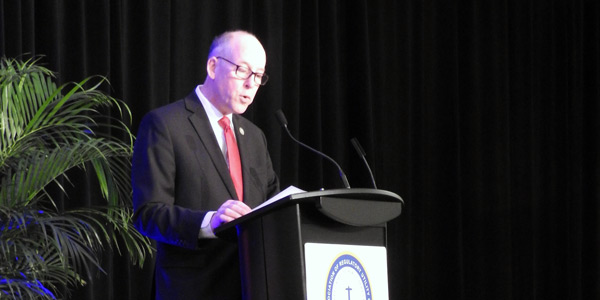By Rory D. Sweeney
WASHINGTON — U.S. Rep. Greg Walden (R-Ore.) said the agenda of the House Energy and Commerce Committee that he chairs will hew close to traditional party positions, emphasizing the importance of letting states and market forces guide development rather than policies and regulations.
Walden made the comments while addressing the National Association of Regulatory Utility Commissioners at its annual winter meeting. He requested the opportunity to roll out the agenda to the conference, according to NARUC President and Pennsylvania Public Utility Commissioner Robert Powelson. “With a unified government, we actually have a rare opportunity to enact reforms that build on energy abundance, modernize our energy infrastructure and promote domestic manufacturing and job growth,” Walden said. “You can be certain that we will ensure our efforts focus on the issues that matter most to consumers.” (See Interdependence Key to Cyber Efforts, Congress Told.)
The country has been held back by a “Washington-centric, regulatory and environmental agenda,” he said, that was “picking winners and losers, putting reliability at risk and driving up costs.”
The committee will review the interaction between federal and state government on resource planning, such as the Public Utility Regulatory Policies Act, and address “recent efforts by the EPA to erode states’ authority through the Clean Power Plan.”
He called on the new administration to install new commissioners at FERC quickly and indicated the nuclear industry would be a major focus of the committee.
“The Yucca Mountain project must remain central to our nuclear waste-management system,” he said, adding that plans could include authorizing an interim storage facility, along with moving forward on fuel reprocessing. (See related story, Panelists Weigh Prospects for Nuclear Waste Solution Post-Obama.)
Georgia Public Service Commissioner Tim Echols asked Walden’s view on how reprocessing might make the national energy policy more sustainable.
“It’s something, obviously, that other countries do pretty effectively, and I see no reason why we can’t take a look at that seriously in this country,” Walden said. “It’s about time.”
He noted that while the Yucca Mountain project was canceled by the Obama administration, the total future liabilities and payments paid by the U.S. Treasury for nuclear-waste storage doubled to nearly $30 billion over the last eight years. The federal government can no longer collect a nuclear waste fee from ratepayers, he said, but the fund already has $36 billion and collects $1 billion in interest annually.
He also addressed cybersecurity, saying it will require partnerships across industries and input from the state level to implement in a “thoughtful way.” (See related story, States Unsure of Cybersecurity Best Practices; Santorum Seeks ‘Warriors’.)




